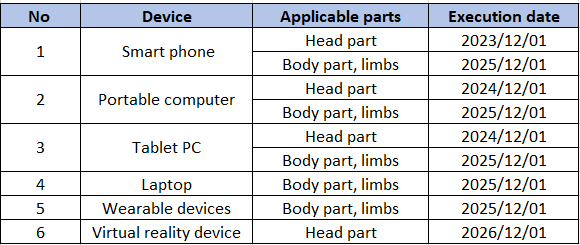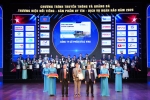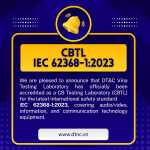| [Australia] ACMA, LIPD class license update Recently, the Australian Communications and Media Authority (ACMA) issued a new standard “Radio (Low Interference Potential Device) Class License 2023 (No. 2) to update the original LIPD Class License “Radio (Low Interference Potential Device) Class License 2015”. " was announced. The new standard "Variation 2023 (No. 2)" will implement the following updates compared to the previous one: 1. Increase existing power limits and allow outdoor operation of devices operating in the 5150-5250 MHz band 2. Include a definition for “indoors” 3. Execution of out-of-band emission limits for RLAN devices operating in the sub 6 GHz band [El Salvador] Release of 6GHz frequency band for Wi-Fi application of indoor low-power devices On July 9, the General Superintendent of Electricity and Telecommunications issued Resolution T-0408-2023 determining to update the National Frequency Allocation Table (CNAF) for the 6 GHz band allocated for unlicensed use for data transmission and reception in Wi-Fi wireless technology. According to this, we are talking about low-power and limited indoor devices with the following technical considerations: 1. WLAN (Wi-Fi): 5925 to 7125 MHz 2. PIRE Max: 30dBm/Spectral Density Maximum, 5dBm/MHz for access devices 3. PIRE Max: 24dBm/Spectral Density Maximum, -1dBm/MHz for client device The access device must be powered directly from utility power, batteries are not permitted. [Guinea] ARPT's new Resolution No. 003 In the new resolution announced by ARPT this time, the validity period of the certificate has been changed from permanent to three years. Even if you have previously received a permanent authorization, it is only valid until the third year from the date of issuance and must be renewed before expiration. Authorizations issued when the validity period was 5 years prior to being permanently amended are valid until that expiration date. [Indonesia] SDPPI implements local SAR test SDPPI will formally implement Specific Absorption Rate (SAR) testing from 2024 to 2026, starting with mobile phones (head-tested) on December 1, 2023, with additional devices in the six categories below.
From December 1, 2023, only local test reports issued by SDPPI Labs in Indonesia can be used for new applications, renewals and recertification. There is a two-year grace period to apply the new SAR regulations. During this period, new certificate, renewal and recertification applications must also submit a statement that the product will be tested for SAR at the SDPPI Lab, along with the required test report. After SDPPI issues a certificate, you are given up to two weeks to submit your SAR test report. The certificate will be revoked if the test report is not delivered on time or if the test results are unsuccessful. [Singapore] Suspension of equipment registration and sales of 3G-only mobile terminals and non-VoLTE mobile phones/smartphones On July 26, IMDA announced the suspension of equipment registration and sales of 3G-only mobile terminals and non-VoLTE mobile phones/smartphones. A summary is below: 1. IMDA, along with Singtel Mobile Singapore, StarHub Mobile and M1, have announced plans for 3G network outages and 3G service offerings from the three companies effective July 31, 2024. Accordingly, IMDA will stop new registration and renewal of 3G-only mobile terminals and non-VoLTE mobile phones/smartphones from November 1, 2023. 2. From 1 February 2024, IMDA will cancel approved registrations of 3G-only mobile terminals and non-VoLTE mobile phones/smartphones. From this time on, the sale of the equipment for local use is prohibited. [Kuwait] CITRA suspends licensing of 2G and 3G communications devices The Kuwait Telecommunications and Information Technology Regulatory Authority (CITRA) issued Resolution No. 297/2023 on 11 June 2023 regarding the suspension of import and entry permits for telecommunications peripherals operating on 2nd and 3rd generation technologies or both. announced. From September 1, 2023, telecom devices that operate only on 2G and/or 3G are prohibited from importing into and entering Kuwait. [Laos] MTC Announces Update on Type Approval and Labeling Requirements MTC is notified of Notice No. We published 0416 on the 21st of this month, the summary is as follows: - Testing laboratories must have ISO/IEC 17025. - For Type 1 equipment, the TA certificate and DoC are valid for 3 years. - For Type 2 equipment, the validity period of the TA certificate and/or DoC has been changed from 3 years to 1 year. This is because Laos currently has many types of devices, including authentic, counterfeit and low-quality devices, which have the potential to cause harm and interference to other networks and other equipment. All products submitted and approved before August 4th are valid for 3 years, but products obtained after that are valid for 1 year. Authorizations you already hold will remain in effect until their expiration date. - 5G network equipment must pass the GSMA's NESAS standard. 5G network equipment refers to telecommunications carrier equipment such as core network (5G Core), transmission network (optical network), and wireless network (base station), and does not include terminal equipment or user equipment.
Source: dtnc.co.kr |
[GMA News] Summary of some new regulations for telecommunications equipment in Australia, Singapore, Indonesia, Laos
10:34 - 16/08/2023
Australia, Guinea, Indonesia, Singapore, Laos have issued a number of new regulations related to frequency bands and certificates for telecommunications equipment with the following content:










![[MIC] Officially issued QCVN 134:2024/BTTTT - National technical regulation on specific absorption levels for handheld and body-worn radio devices according to Circular 19/2024/TT-BTTTT of Ministry of Information and Communications](https://cdn0577.cdn4s.com/thumbs/qcvn-134_thumb_150.jpg)



![[Latest] Circular 02/2024/TT-BTTTT regulating the List of potentially unsafe products and goods under the management responsibility of the Ministry of Information and Communications](https://cdn0577.cdn4s.com/thumbs/trang-huy-hieu-the-loai-logo-2_thumb_150.jpg)